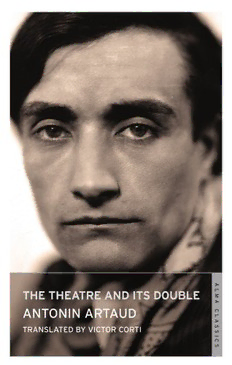
The theatre and its double: essays PDF
Preview The theatre and its double: essays
antonin artaud was born in Marseille in 1896 and died in Paris in 1948. He was an actor, poet, director and theatre critic. In 1927 he founded the Théâtre Alfred Jarry with Roger Vitrac. His influence is widespread in the theatre today, notably in the plays of Adamov, Audiberti, Camus and Genet, and in the productions of Barrault, Vilar and Peter Brook. The Theatre and Its Double Antonin Artaud Translated by Victor Corti ALMA CLASSICS alma classics ltd London House 243-253 Lower Mortlake Road Richmond Surrey TW9 2LL United Kingdom www.almaclassics.com The Theatre and Its Double first published in French in 1964 First published in Great Britain by Calder & Boyars Ltd in 1970 This revised translation first published by Alma Classics Limited (previously Oneworld Classics Limited) in 2010. Reprinted August 2011 This new edition first published by Alma Classics Ltd in January 2013 Copyright © Éditions Gallimard 1978 This revised translation © Alma Classics Ltd 2010 Printed in Great Britain by CPI Group (UK) Ltd, Croydon, CR0 4YY Front cover image © Getty Images isbn: 978-1-84749-332-3 All rights reserved. No part of this publication may be reproduced, stored in or introduced into a retrieval system, or transmitted, in any form or by any means (electronic, mechanical, photocopying, recording or otherwise), without the prior written permission of the publisher. This book is sold subject to the condition that it shall not be resold, lent, hired out or otherwise circulated without the express prior consent of the publisher. Contents The Theatre and Its Double 1 Preface: Theatre and Culture 3 Theatre and the Plague 9 Production and Metaphysics 23 Alchemist Theatre 34 On the Balinese Theatre 38 Oriental and Western Theatre 49 No More Masterpieces 53 Theatre and Cruelty 60 The Theatre of Cruelty (First Manifesto) 63 Letters on Cruelty 72 Letters on Language 75 The Theatre of Cruelty (Second Manifesto) 88 An Affective Athleticism 93 Two Notes 100 Notes 104 Appendix 115 Documents Relating to The Theatre and 117 Its Double Notes to the Appendix 149 The Theatre and Its Double* Preface: Theatre and Culture* At a time when life itself is in decline, there has never been so much talk about civilization and culture. And there is a strange correla- tion between this universal collapse of life at the root of our present-day demoralization and our concern for a culture that has never tallied with life but is made to tyrannize life. Before saying anything further about culture, I consider the world is hungry and does not care about culture, and people artificially want to turn these thoughts away from hunger and direct them towards culture. The most pressing thing seems to me not so much to defend a culture whose existence never stopped a man worrying about going hungry or about a better life, but to derive from what we term culture ideas, whose living power is the same as hunger. Above all, we need to live and believe in what keeps us alive, to believe something keeps us alive, nor should every product of the mysterious recesses of the self be referred back to our grossly creature concerns. What I mean is this: our immediate need is to eat, but it is even more important not to waste the pure energy of being hungry simply on satisfying that immediate need. If confusion is a sign of the times, I see a schism between things and words underlying this confusion, between ideas and the signs that represent them. We are not short of philosophical systems; their number and con- tradictions are a characteristic of our ancient French and European culture. But where do we see that life, our lives, have been affected by these systems? I would not go so far as to say philosophical systems ought to be directly or immediately applied, but we ought to choose between the following: Either these systems are a part of us and we are so steeped in them we live them; therefore, what use are books? Or we are not steeped in 3
